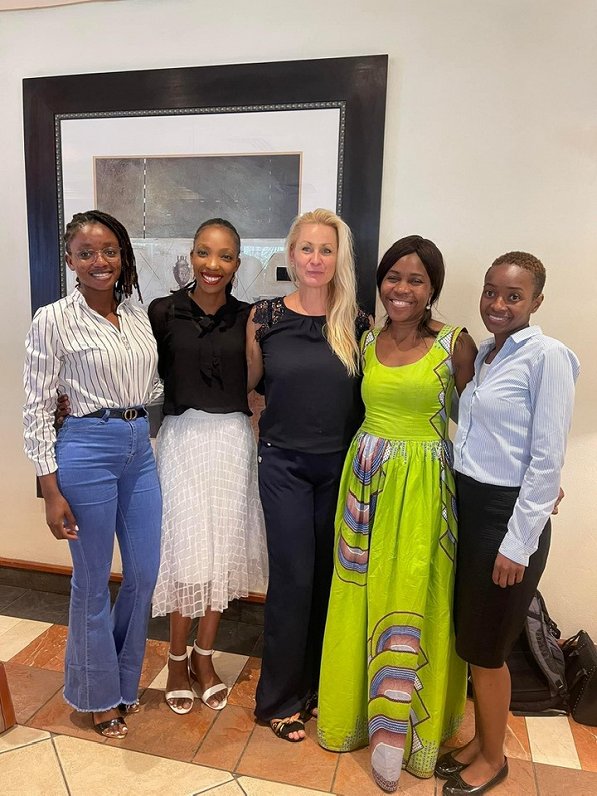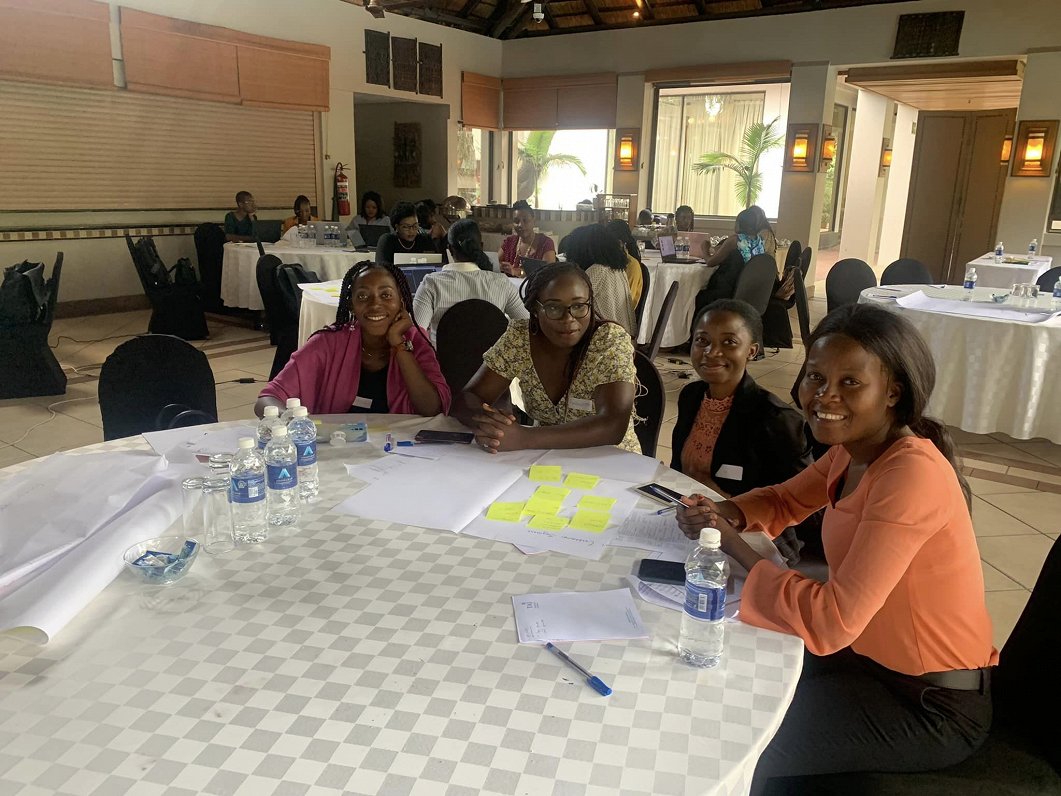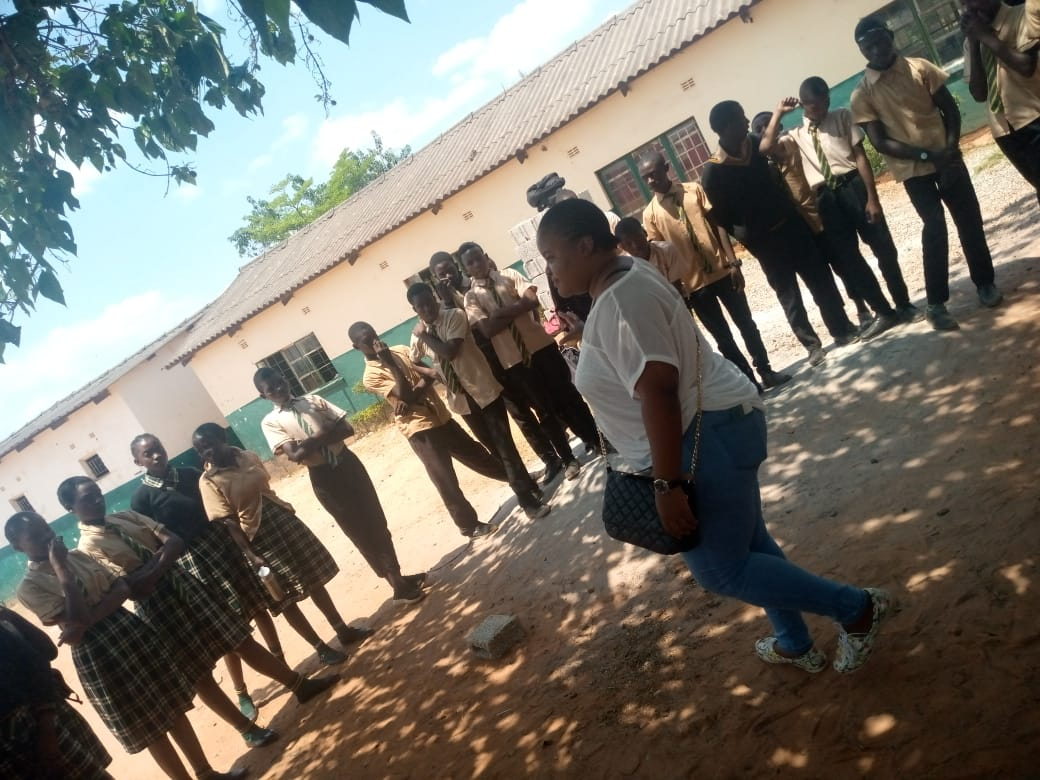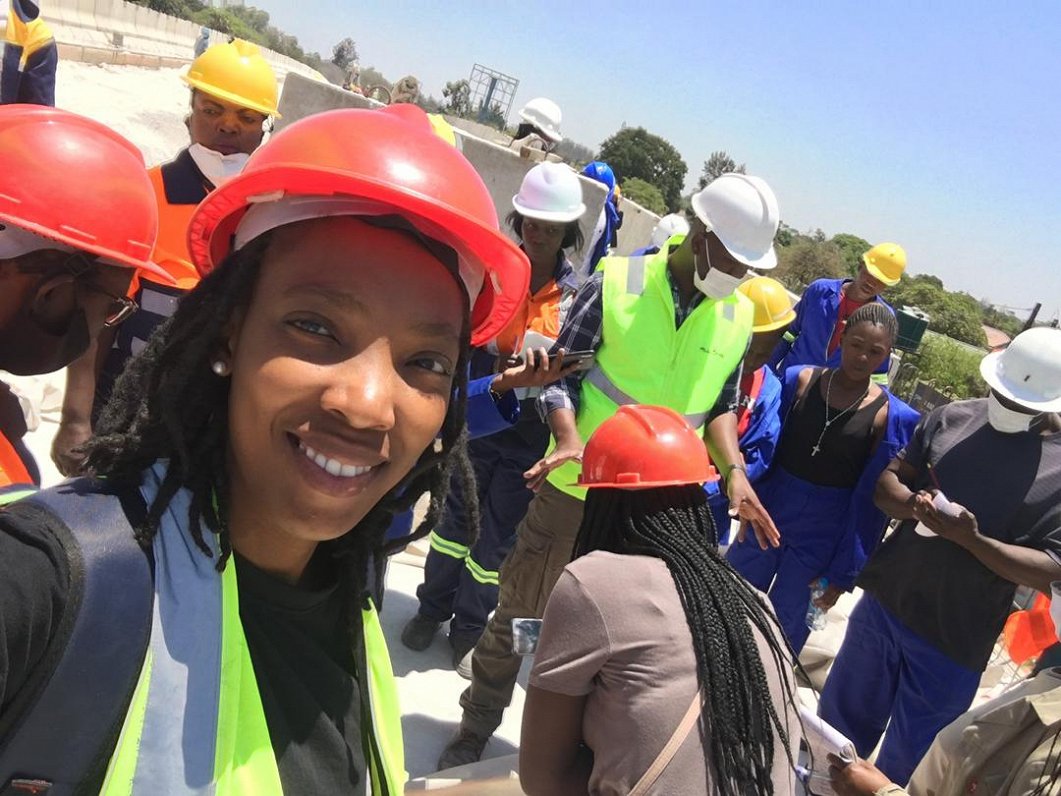In turn, state administration institutions, NGOs and entrepreneurs in Zambia and Namibia, and Zimbabwe are looking forward to the next stage of cooperation with Latvia – sharing expertise and exploring cooperation opportunities, for example, in the field of e-government digital services, value addition innovation for end products in agriculture, collaboration in education and science, and similar areas.
The project ‘She Rebuilds the World’ is the first large-scale development cooperation project of the Republic of Latvia on the African continent, supported by the Latvian Ministry of Foreign Affairs, the potential of which in the future is huge, impactful and of high importance for Latvia and the participating African countries.
Sarah Ngoma Bweupe is a young female entrepreneur in Zambia. She is a carpenter and construction supervisor. She runs a carpentry company which is engaged in the manufacture of cabinets, design and installation of built-in kitchens and cabinets. Sarah trained her brothers in carpentry skills now working for her company.
Together with seventy-two other young women from Namibia and Zambia, Sarah is enrolled and studies in the online entrepreneurship course at the Riga Business School, Latvia.
"It's a rare privilege to be one of the few selected African girls included in this project, being trained and receiving mentorship support in business, and I'm very happy for that opportunity," says Sarah.
Indeed, the number of applications for the enrolment in the project ‘She Rebuilds the World’ was fivefold of the capacity limits forecasted by the project organizers. Sarah found out about the project from Zambia Development Agency, one of the national partners of the project in Lusaka. She was invited as a guest speaker, as a successful businesswoman to inspire the project participants. But, as Sarah found the project very interesting, she enrolled herself in the project to wider her business skills and challenge herself on the development of new business opportunities.
The project is ideated and executed by the Latvian diaspora organization #esiLV. #esiLV is an association uniting Latvian diaspora scientists, entrepreneurs, business clubs and professionals all over the world. The main Latvian education partner in the project is Riga Business School.
Africa's opportunities
The project connects not just Latvia, Namibia, and Zambia but also different countries on the European continent. Latvian diaspora abroad residing in different European countries and high-level professionals living in Latvia are working together hand in hand in delivering excellent experience and provide state-of-art education to the project participants.
, the initiator and key lead of ‘She Rebuilds the World’ project lives in Rome, Italy and works as a professor at the largest American university in Europe at F. Guarini Business School of John Cabot University. Ieva is fascinated by the civilizations outside of the Western cultural spheres working with China and Africa for the last decade. Moreover, from the point of international trade, Africa was, is, and will be crucial for the growth and prosperity of the European continent. With the project its executive team aspires to share the knowledge and expertise for growth of the African continent as well as establishing and strengthening North-South collaboration among academia, universities, NGOs, and entrepreneurs.

Latvian experts having had first-hand experience in both African countries admit that there is a field of huge and unexplored cooperation opportunities for Latvian entrepreneurs, industry professionals, and scientists and education experts.
"In Europe, we need to be aware that Africa is not a faraway continent. It is our neighboring continent. The recent encounters with the troubles in Africa on the European continent highlight the need and duty for us to assist the African countries to develop their business and social environments, to build their capacity for strengthening their countries, communities, and individuals. Latvia as a small country is very resilient and agile, thus, can establish sound cooperation networks in a short span of time. We can efficiently profile ourselves as sharers of knowledge, of innovative approaches to traditional sectors of the economy and of new technological advancements in digitalization.
"For our participants, aspiring female business leaders in Namibia and Zambia, on the other hand, this is the right time to fulfil their business dreams and aspirations on a pan African scale as the African Continental Free Trade Area is at its sound launching stage," says Ieva Jākobsone Bellomi.
Ieva has extensive experience in commercial diplomacy working at the Latvian embassies in London and Beijing. Currently Professor Ieva Jākobsone Bellomi is also the Board Member and the Lead of the #esiLV Country Brand think-tank. The project ‘She Rebuilds the World’ is an attempt to highlight the Latvian strengths in entrepreneurship, education, and women leadership with the assistance of diaspora professionals’ knowledge and worldwide networks.
"This project is a way to showcase Latvia as a small, but smart, innovative, and enterprising country. Globalization continues but the global political, trade and social axis is increasingly moving South. African continent with its beautiful landscapes and charming people shall play an increasingly important role on the world stage," she says.
Official approval
In October last year Latvian experts visited Sub-Saharan Africa where young and aspiring female entrepreneurs in Namibia and Zambia got involved in an intensive entrepreneurship bootcamp training and the countries’ civil servants, representatives of chambers of commerce, and businesspeople were immersed in sharing knowledge about and experience on national business development issues, sustainable economic development path, and women empowerment initiatives.
Latvian delegations – independent experts and their academic colleagues from Riga Business School were warmly welcomed in both countries at the highest level. In Namibia Latvian delegation informally met with the Namibian President, Vice-Premier and Speaker of Parliament, while in Zambia the cooperation for the future
was cemented with the University of Lusaka.
"Namibia has a higher level of economic development, thus, the project participants had already solid theoretical understanding of business. Though, practical approach to building a business step by step was a strong project appeal to the participants in Namibia. Zambia, on the other hand, is less developed, thus, young entrepreneurs have limited opportunities to learn and conceptualize their business ideas. Zambian participants were also more focused on applying business concepts on solving social problems at large – gender equality, diversity, and inclusion, accessibility of entrepreneurship programs to disadvantaged societal groups," says Ieva Jākobsone Bellomi, herself visiting and partaking in the events in Lusaka, Zambia’s capital. She was joined by ‘Mrs Zambia’ Zindaba Hanzala, the Brand Ambassador for the project ‘She Rebuilds the World’ in Zambia and Co-founder of a social enterprise called Mulimi which provides agro-financing, agro-insurance, technical support, and market linkage to small scale farmers in Zambia.
Historic connections
Latvian business environment expert Ģirts Greiškalns conducted specialized workshops on economic transition and national economic diversification policies for the governmental and non-governmental organizations, and entrepreneurs in Namibia.

"To prepare tailored made workshops, we worked together with our Namibian partners Business Financial Solutions and Namibian Investment Promotion and Development Board for months to understand the topics which would be relevant and important for the target auditoria. The Namibian side was very interested in Latvia’s economic transitioning and transformation, support infrastructure for start-ups, e-governance and digital solutions, and civic engagement in governance. These are the key areas we are focusing to continue to share our experience and broaden our cooperation with Namibian side. The entrepreneurs, especially female entrepreneurs, need an efficient and fair, and inclusive business environment to compete and grow. This is the reason we are complementing the entrepreneurship education activities with our experience in developing sound business environment for the entrepreneurial success," says Greiškalns.
"Like any other country, Latvia is not perfect, so our philosophy was not to come and teach, but to share – successes and mistakes, and learn from them. I could feel that the Namibian counterparts highly appreciated such an approach and are willing to engage in the future common activities.
"Personally, I found very interesting how similar the histories of our two countries are: Namibia was under the neighboring South Africa’s governance for decades. Namibia also has been exposed to the world superpowers, specifically Germany being a German colony from 1884 until the First World War. Namibia gained its independence in 1990, at the same time as Latvia did [its regained independence]. Sharing these little connecting points of our histories broke down communication barriers and we naturally felt closer to each other."
'I can improve other people's lives'
From January to May this year Namibian and Zambian young and aspiring female entrepreneurs are continuing their entrepreneurial studies at the Riga Business School online. The African ladies are studying and developing business ideas and plans together with other Riga Business School students, as well as building networks and friendships across Namibia, Zambia, and Northern Europe.
North-South connectivity in education is one of the European Union’s priorities for the European and African continents. It is also one of the three fundamental objectives of the project – providing young females in Africa with sound entrepreneurship skills, building strong, supportive, and inclusive national business environments, and connecting young future leaders of the global North and South.
"With the help of our Professor Mike Wells, I've learned quite a few things that I felt weren't needed in the business world, but now I see that I can take my business to a whole different level," says Sarah Ngoma Bweupe.
She also lists quite specific things she learned: how to look for investors, how to run business accounts, check profits and losses, how to conduct market research, how to expand the offer – which she is looking forward doing shortly:
"I will use all my knowledge to offer more diverse services, introduce new ones, and create more jobs in my community. I dream of owning a large construction company that will employ a lot of people, thereby helping to reduce poverty and raise living standards, as well as to promote the development of my country, Zambia. I'm making new contacts right now and I'm looking forward to meeting new mentors in my business area."
Samantha Lukonde is the founder of the organization "Girls Innovation Through Sport Zambia". Initially, it was a club with volunteers who provided resources to help young mothers, as well as to inform the public about the challenges these young mothers face and to combat child sexual abuse. The organization was officially registered in 2021, and since then more than 1000 young girls and women have been helped. More than 500 people have been given the opportunity, by allocating initial working capital, to start their own small businesses to combat poverty and to have access to education.

"We use sport as a tool to drive social change. Our organization hopes that one day there will be no more child marriages, that everyone will have access to information about sexual reproductive health, and that the number of early education centers will be increased," says Samantha.
"The project 'She Rebuilds the World' for me is an opportunity to meet like-minded people who are ready to help each other. These are women who are ready to grow, become strong at different social levels, ready to learn and share their stories on how to improve and develop communities through their businesses, albeit small ones. It's also an opportunity for me, as a young woman, to step out of my shell and realize my potential and to be able to improve other people's lives," she says.
Samantha trains low-income girls in her community and says this program gives her new knowledge on how to improve the curriculum on entrepreneurship and how to build small businesses: "I've gained more confidence in my ideas, learned to see the resources that are all around me, and just need to be identified and used. A lot of the doors seem closed, but it depends on where in the room the person is standing."
More projects planned
"It is heart-warming to see that in a such a short time with a simple pilot project we can see actual results. Some of the most active young entrepreneurs have legally registered their companies, thus, joining the formal economy’s segments. The new business ideas are crossing different industries – from seaweed products and new flavors of fruit powder tested in the kitchen to the money management financial app for young people as well as start-ups and small and medium sized companies," Ieva Jākobsone Bellomi says.
It should be admitted that the entrepreneurial ambitions of the project participants are impressive and far reaching. Exporting to European markets is considered as a viable option for the business scaling thanks to the networks created in the scope of the project.
#esiLV is ready to continue the work on the women empowerment initiatives in Africa and build on unexpected success of the project. The entrepreneurship bootcamps in the target countries followed by an official three months’ certificate course at the Riga Business School shall be the founding block for education and capacity building for young and aspiring entrepreneurs in Namibia, Zambia, and Zimbabwe in the next phase of the projects. Simultaneously, based on the feedback from the workshops in Windhoek and Lusaka last October and further discussions with the partners on the ground, targeted executive training and workshops are planned.
In Namibia the key focus areas of the training and workshops are e- government and digitalization, with the focus on civic society’s inclusion in the administrative and decision-making processes. In Zambia and Zimbabwe, on the other hand, the focus is on the agriculture sector – EU accredited innovation expert from Latvia shall conduct a year-long training and workshops for the countries’ farmers and businesspeople on how to innovate high value-added end products.
Within the framework of the existing project, an excellent cooperation has been cemented with the original partners - Zambia Development Agency and Business Financial Solutions in Namibia, as well as Zambian embassy in Rome and Namibian Embassies in Paris and Helsinki. Strong relationships are being also established with new cooperation partners at the highest level: Namibian Investment Promotion and Development Board, Ministry of Small and Medium Enterprises Development and University of Lusaka, Zambia. With the latter one it is planned to bring the project to the EU level in the scope of the Erasmus Plus framework.
The underlying project philosophy, the women leadership and empowerment, shall be strengthened going forward to raise confidence in young and aspiring female entrepreneurs in Namibia and Zambia. This shall also be complemented with the leadership coaching sessions in the African countries. The completion of the current pilot project is scheduled at the end of May this year.
Meanwhile, Sarah N. Bweupe says with full confidence: ‘I believe, and I know that my future shall be bright!’.
































